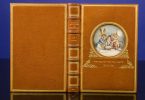Once again, it’s time to play with words, from traditional salutations for the New Year to expressions of gratitude to all who participated in the Bibliopole’s Bibliopoll contest announced on this page in November.
 So let us begin by wishing all book lovers, and books themselves, health, happiness, sturdy shelving, routine dusting, and protection from the elements and ineptitudes in 2006. That said unpithily, we must say how much we enjoyed all of the created book-related words, based on the Greek biblion and submitted as expressions of something that no word in the dictionary says as well.
So let us begin by wishing all book lovers, and books themselves, health, happiness, sturdy shelving, routine dusting, and protection from the elements and ineptitudes in 2006. That said unpithily, we must say how much we enjoyed all of the created book-related words, based on the Greek biblion and submitted as expressions of something that no word in the dictionary says as well.
The contest was inspired by our own need for words to describe the foul smell that can afflict books (we came up with bibliosis) and the individual sufferer (we call it a bibliose). Neither term have we ever found in a dictionary (we’re still looking), and the submissions readers sent share that elite status.
Here are some of those evocative and entertaining words:
“In the desert of nothingness we find refuge in books,” wrote a wise soul to define “biblioasis.”
No doubt that’s where one would encounter a “bibliogour,” who likes to read and discuss books while eating fine foods. No sauces stain bindings, nor crumbs besmirch pages, of course, because this is one of the few perfect-world scenarios.
Both place and activity described above would be heaven for the “polybiblious,” which describes those who read many books at once. Is it a pleasure and normative to some, an uncontrollable mania to others, or just the way things work out with one’s reading choices and reading time? (This condition cries out for a poll of its own. How many of us have our bedtime book, our breakfast table tome, our required reading for the sake of business, even our “beach book” or that return-to-childhood rediscovery of a story remembered for decades?)
Does being polybiblious contribute to other conditions? There are people who experience “bibliosomniculosus,” or post-all-night-reading sleepiness, also known as a beautifully literary means of not getting up on time in the morning. Related but potentially more hazardous (don’t drive or operate heavy machinery!) is “biblionarcolepsy,” or falling asleep anytime during the day after reading late the night before.
No one may be better suited to reach the biblioasis or anywhere else than the “biblionaut,” who travels quite literally by the book, or books, that expand all our horizons.
A single journey, real or imaginary, by the great book route provides plenty of fuel for “bibliophasia,” which connotes “the outpouring of book-related conversation that naturally occurs when two bibliophiles meet.” Though “-phasia” usually refers to a disorder, here it signals something wonderful, at least among book lovers. The practice can also be called “bibliobabble,” if the content is unintelligible, unintelligent, repetitive, or the speaker is younger than 18 months.
Moving from the spoken to the visual, there is “biblioptic.” This is the “innate tendency (often inherited) in which one ogles books everywhere — shops, friends’ homes, in that lady’s bag on the bus. Unfortunately (or fortunately), it is incurable.”
One of the lures of reading may be another innate tendency, the perhaps unconscious desire to attain “bibliospicacity.” Each reader may need a more personalized definition, but there is much to ponder in that which accompanied this submission: “The clarity of mind and understanding one takes from a recently completed textbook on quantum physics or any novel by James A. Michener.”
Among other coinages were the obvious but useful “biblionerd” and “bibliomaven” (though we dispute the latter’s definition on a minor but significant point: the term for an experienced Jewish bookdealer need not specify that the individual is old!).
“Biblio” alone stands out in an active role as a verb: “She biblioed to find a good book on dachshund training.” This usage (trolling the Internet) might be expanded to browsing through a bricks-and-mortar store or one’s own library.
The love of books inspired them, so all submissions are winners in our opinion. But by a mil, by which we measure the thickness of the protection so many books need, the prize of a copy of Trivial Pursuit: Book Lover’s Edition goes to David Bloomquist for a word we hope to see someday in the OED: “biblioasis”.







Thanks for finally writing that.
Thank you for the resources. You have so many beautiful minis and so amazing web page! Wish you all the best in the future.